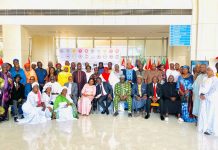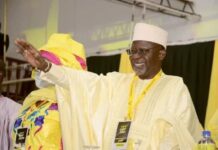INTRODUCTION
- The CSO Coalition on Elections – The Gambia, spearheaded and coordinated by the West Africa Network for Peace building (WANEP) – The Gambia, is a home grown national platform established in 2006 to facilitate civil society participation in elections, democracy and governance. With a membership of about 20 Civil Society Organizations, the CSO Coalition on Elections seeks to participate and influence public policy through elections monitoring and observation.
- For the purpose of the 12 May 2018 Local Government Election, the CSO Coalition on Elections – the Gambia operationalized an Election Situation Room (ESR) with funding from the United Nations Development Program (UNDP) in the Gambia to observe, report, analyse and facilitate responses to the peaceful conduct of election.
- A team of 30 Long Term Observers (community conflict monitors) were deployed nationwide to monitor the pre election context including the nomination process and campaigns. On Polling Day, 150 observers were deployed nationwide to all 8 Local Government Administrative areas to observe the opening, voting, closing, counting and collation processes.
- The CSO Coalition’s assessment is based on the principles and standards for the conduct of democratic elections and the legal framework for the conduct of elections in the Gambia.
In this regard the CSO Coalition wishes to submit its initial observation report based on reports obtained from our conflict monitors and domestic observers. This report also highlights concerns and recommendations on the election and related matters.
SUMMARY OF KEY FINDINGS
- Pre-Election Observation
- Nominations
The nomination process was relatively peaceful and stable with no major incidents of violence observed. Aspiring
candidates were vetted by the IEC as prescribed by Section 42 of the Elections Act to ascertain their eligibility to
contest. The CSO Coalition observed some minimal violent disturbances during the nomination period as well as
an assault on journalists at the Kanifing Regional IEC office.
The CSO Coalition notes that there were objections to nominations of some candidates in accordance with
Section 49 of the Elections Act and the IEC made crucial interventions to address these. Several candidates also
withdrew their nominations in accordance with Section 51 of the Elections Act.
- Campaign Period Observation
The campaign period, from 27 April to 10 May 2018, was generally peaceful and parties and candidates were
able to conduct their activities without major disruptions except in few cases. There were also allegations of vote
buying. Notwithstanding, parties and candidates devoted significant time to campaigning particularly on social
media, which resulted to slandering by supporters from the various parties and candidates.
Hate speech and inciting languages were particularly observed during this campaign period. Incidents of
politically motivated violence including threats and some clashes between opposing sides were evident and
reported. Observers also noted lack of adequate security provided to campaign rallies in most cases.
The CSO Coalition notes with concern that some political parties and candidates violated the Code on Campaign
Ethics notably the failure to observe the May 11th Campaign Free day. Some candidates were canvassing for
votes particularly within Banjul, contrary to Section 85 of the Elections Act without any punitive measures taken by the IEC.
The CSO Coalition further notes with concern the lack of campaign finance regulations. The absence of the
regulatory framework enables political parties to spend without ceiling and with limited information on how their
campaign finances are being generated. This is bound to create an unequal playing field amongst candidates.
The CSO Coalition welcomes the introduction of Campaign debates between contestants. This is a progressive development that provides the space for contestants to share their policies, and for supporters to have an
opportunity to choose the candidate of their choice.
- Observation of Polling Day
- Opening of Polls
Generally, the opening of polls started at the stipulated time although voting began late in some places but not
later than 30 minutes from opening of polls. Opening process was smooth and peaceful. Procedures were
generally followed to ensure secrecy of the vote; however, there were isolated cases where the curtains were
translucent and polling staff did not count the marbles before the commencement of voting as required by IEC
elections regulations. It was also observed that enough materials were available in most polling stations. Some
polling stations did not have adequate voter information fully displayed. Media practitioners were by and large
absent but polling agents were present in most of the polling stations at the opening.
- Voting Process
The voting process was orderly and peaceful and the secrecy of the ballot was generally guaranteed in most
polling stations. The layout of polling booths and ballot drums were found to be largely convenient. Polling
stations had the full complement of polling staff even though some parties or candidates did not have their agents
present. The gender distribution of polling staff was also found to be adequate.
Contrary to Sections 68 and 69 of the Elections Act, few isolated incidents of voting by at least two wrong card
holders was noticed due to lack of due diligence by the polling staff. However, attempts by other voters to use the
same voter’s cards was detected and prevented.
Accessibility for voters with physical disability remains a challenge in many polling stations. Either the booths
were situated on sandy surfaces or in rooms or raised platforms with steps to climb. The location of some polling
stations in public places such as mosques, markets and populous streets posed a challenge for many as the
presence of unauthorized persons was inevitable because of the use of those places for other purposes. In some
polling stations, entrance to booths was too narrow to allow a voter on wheelchair to enter.
The incidence of inducement of voters on behalf of candidates, contrary to Section 70 of the Elections Act, as
well as violence was noticed especially in Banjul. It was also observed that some voters could not vote because
their names were not found on the voter list and supplementary voter list. These voters claimed to have voted in
the previous councilor elections.
- Closing of Polls
Generally, polls closed at the designated time of 17:00 hours. In some polling stations, it was observed that some
basic procedures were not fully complied with such as the immediate sealing of the mouth of the ballot drum after
the close of polls. Some of the Presiding Officers used their hands to remove the drum seals for counting instead
of the pliers, and the old seals removed were reused to seal the drums after counting contrary to Section 75(1)(b)
of the Elections Act. Some of the Presiding Officers did not put the broken seals inside the drums before resealing
after counting. An isolated case was reported where a voter came late and was allowed to vote. The presence of
unauthorized persons was observed during the closing process.
- Counting of Polls
Counting of the vote went off peacefully and smoothly in almost all polling stations. While basic procedures were
followed, such as the displaying of counting trays by Presiding Officers for confirmation by polling agents, our
observers noted that IEC officials in many polling stations failed to announce the results loudly for the hearing of
the polling agents as well as failed to read out the numbers on the sealed drums. In some instances, party agents
failed to sign off on the election results envelop. In many polling stations, not all candidates had their agents
present at the counting. The presence of unauthorized persons was noticed mainly because those affected polling
stations were located inside public places such as markets and mosques. Consequently, polling staff were unable
to send them away. It was observed that the counting sieves used in a few polling stations were worn out and
need replacement.
- General Observation
The election process was transparent, peaceful and orderly. We observed incredible teamwork among polling
staff. We also observed a marked improvement on the part of the polling staff to adhere to electoral procedures
compared to the April 12 Councillors elections.
However, low voter turnout continues to hugely beset elections in the Gambia and could threaten the legitimacy
of representative democracy in the country. The failure on the part of parties, candidates and supporters to respect
election laws has also been noticed. Our observers also noticed the presence of candidate symbols and colours as
well as some voters dressed in their party symbols and colours coming to polling stations to vote. The threats to
peace and attempted interference with the vote by individuals especially in Banjul are causes for concern and
requires urgent response by the IEC. On the other hand, the conduct and performance of security personnel on
elections duty was commendable.
- Opinion of the CSO Coalition on Elections – the Gambia
The CSO Coalition on Elections – the Gambia, having observed the 12 May 2018 Local Government Elections
for Mayors and Chairpersons unequivocally certifies that the vote was free, fair and transparent and reflects the
will of the electorates. We found the election to be credible despite the various procedural challenges which in
our opinion could not have affected the credibility of the election.
- Recommendations
In light of the issues and concerns highlighted in this report on the conduct of the 12 May elections and overall
electoral system in the Gambia, the CSO Coalition on Elections – the Gambia hereby offers the following
recommendations as a means to improve elections and democracy in the Gambia:
- Political parties and candidates should recognize that their leadership positions and functions impose on
them a national duty and a sense of responsibility to promote politics of inclusion, non-violence, non-
discrimination and popular participation. For that matter, political parties, leaders and candidates must
refrain from the use of violent and other social exclusion narratives including the promotion of tribalism
and sexism. Parties and their leaders and candidates must urge their supporters to respect electoral laws
and uphold democratic values in their political activities and speeches.
- The Gambia Government should maintain law and order by ensuring that hate speech, incitement to, and
acts of violence are curtailed effectively by the law enforcement agencies.
- The IEC has a legal responsibility to enforce the Elections Act, particularly the Code on Campaign Ethics,
to ensure a non-violent political activity and credible and fair elections.
- The location of polling stations in public places such as open football fields, mosques, markets and popular streets must be reconsidered as they lead to the presence of unauthorized persons in and around polling stations. In most cases, polling staff cannot remove such unauthorized persons because of the function of the location.
- The perennial low voter turnout is a major cause for concern which if not addressed could undermine the
legitimacy of elections as well as elected officials and representative institutions. Therefore, there must be a deliberate and intense drive towards civic education by all stakeholders.
- There is urgent need for the Government to actively and fully empower the NCCE with adequate financial and material resources to be able to conduct massive and sustainable civic education countrywide.
- Consideration must be given to the way and manner polling stations are laid out and positioned to ensure Persons with Disability exercise their franchise in a dignified and convenient manner.
- The CSO Coalition notes with concern the amount of financial resources deployed by all parties and candidates in this election. For that matter, the CSO Coalition strongly recommends that there is need for electoral reforms to address the issue of campaign financing in order to prevent electoral corruption, undue advantage or unfair limitation to candidates.
- There is a need to further strengthen the capacity of IEC’s polling officials to ensure strict adherence to election procedures.
- Security personnel should be oriented to strictly follow the procedures which prohibits the presence of unauthorized persons at polling stations in line with Section 75(4).
- The Gambia Government should institute a gender quota in politics by allocating a number or percentage of Parliamentary and local council seats to women, in line with its international commitments.
- Finally and most importantly, the CSO Coalition wishes to strongly recommend that the Gambia maintains the use of marbles for elections. We have noted that the incidence of invalid votes and the cost- effectiveness of the use of marbles offer more security and transparency of the vote.
- Conclusion
The CSO Coalition on Elections – the Gambia wishes to commend Gambians for exercising their democratic right to express their will in the governance of the cities, municipalities and regions of the Gambia. The CSO Coalition notes that this election marks the end of the 2016 – 2018 electoral cycle which has brought seismic changes in the political landscape of the Gambia. While significant electoral gains have been registered, there remains the need to reform electoral laws, improve the conduct of election, improve voter registration, build capacity of stakeholders in the election system and address the perennial problem of low voter turnout. For that matter, the Government of the Gambia as well as political parties, CSOs and indeed all citizens, with support from our development partners have a responsibility to improve the electoral process and increase voter turnout. Also equally important is the need for political parties to promote the increased representation of women in elective and decision making institutions as well as the active political participation of youth, persons with disability and other vulnerable groups.
Our appreciation to all the members of the CSO Coalition – the Gambia and all the partners who have participated in the monitoring of elections. Your commitment is indescribable.
The CSO Coalition gives a special tribute to the Chair of the IEC Alh. Momar Njie for overseeing the most
significant and indeed the most turbulent electoral changes in the history of the Gambia. With him and his staff,
the CSO Coalition enjoyed immense cooperation.
Finally, the CSO Coalition on Elections – the Gambia wishes to sincerely and profoundly thank the UN System in The Gambia, most particularly the UN Resident Coordinator, Mrs. Ade Mamonyane Lekoetje, for their immense support and collaboration in the elections processes of The Gambia. If we are seeing farther than others, it is because we are standing on the shoulders of these giants. We hope that this partnership will continue in our quest to increase voter participation in elections and contribute to the strengthening of participatory democracy and good governance in The Gambia.



















